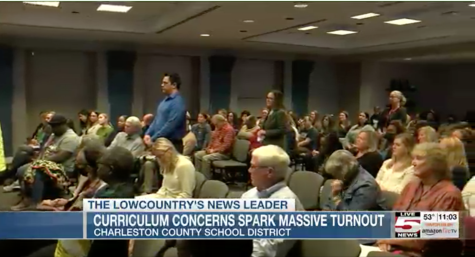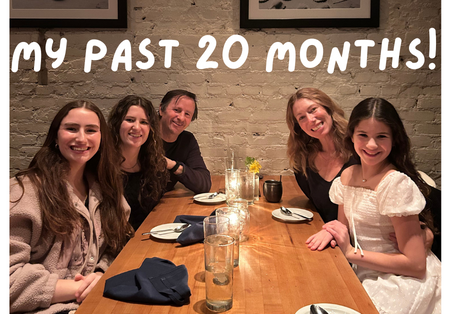EL Education and CCSD
Local update and opinion about EL Learning in CCSD
On Monday, February 13th, I attended a school board meeting for the Charleston County School District. The subject of the discussion was the removal of the EL Education curriculum from CCSD schools. Based in New York, EL Education is a nonprofit that works with schools and districts across the US to raise students’ achievement and encourage equal opportunities. The School Board did not make any decisions during the meeting because of a scheduling error, but they did receive passionate public commentary. During the meeting, many vocalized their support of the EL curriculum, from teachers and parents to students themselves. I was impressed and inspired by many regarding this topic. Since there has not been much coverage of this recent controversy, I thought I would write about EL Learning and why it can be so critical for students in Charleston County Schools
What is the EL Education?

EL Education is nonprofit aiming to partner with K-12 educators to transform public schools into places of equal opportunity and outcomes for all students. The model for EL Education focuses on Real-World Curriculum, Invigorating Instruction, Assessing Student Learning, Respectful Culture, and Leadership.
Real-world Curriculum: EL Education emphasizes a real-world curriculum, with “project-based learning expeditions, case studies, projects, fieldwork, and service learning”, so that students can attain that out-of-classroom experience, contributing to work for audiences beyond the classroom.
Invigorating Instruction: This focuses on emphasizing the student’s voices, rather than the teachers. Through this instruction, classrooms are filled with “discovery, inquiry, critical thinking, problem solving, and collaboration.” All lessons have specific goals and learning targets for students to take responsibility for. A culture of high achievement is developed in the classroom.
Assessing Student Learning: Student-engaged assessment is highlighted. Students are continuously conducting learning assessments and improving their work through “models, reflection, critique, rubrics, and expert assistance”. Staff members also conduct data inquiry and analysis by examining student work and formal assessments.
Respectful Culture: EL Education builds cultures of “ respect, responsibility, courage, and kindness”, through various social structures and traditions.
Leadership: Leaders focus on student achievement and improvement, emphasizing joy in learning and constructing a culture of trust and collaboration.
Equity and Anti-Racism
EL Learning believes in anti-racist education. They believe in education being a powerful engine in disrupting structural racism to fulfill equal opportunities for all students.
They follow these pillars of educational equity:
- Instruction and assessment that challenge, engage, and empower learners
- Access to standards-based, content-rich, culturally affirming curriculum
- School culture that fosters positive identity, belonging, agency, and purpose
- Explicit anti-racist discussion, practice, and action
They are committed to:
- Examining how racism lives in each of us as individuals, and in the fabric of our organization and its policies, culture, and traditions
- Holding ourselves accountable to equitable and excellent outcomes in the schools and districts with which we work
- Holding ourselves accountable by providing consistent, transparent, and candid reviews to our staff, Board, and partners on our DEI (Diversity, Equity, and Inclusion) strategies and commitments
- Educating ourselves and taking action over time to grow as an anti-racist organization
The ten building blocks of EL Education

- The Primacy of Self-Discovery
- The Having of Wonderful Ideas
- The Responsibility for Learning
- Empathy and Caring
- Success and Failure
- Collaboration and Competition
- Diversity and Inclusion
- The Natural World
- Solitude and Reflection
- Service and Compassion
It is apparent through these 10 building blocks that EL Learning expands beyond traditional notions of learning. Crafted from Harvard scholars, these building blocks serve as the foundation for the learning that occurs through this type of education.
Why EL Education is Significant:
As many people brought up in the board meeting, the EL Education curriculum has shown vast improvement particularly in under-achieving schools. EL Education could help close the achievement gap, as it already has shown to do within this past year. Its curriculum is much more inclusive than traditional ones, and therefore relatable to students, instead of leaving certain students out. In addition, its anti-racist principles are especially significant for students to learn in the current state of our country. Finally, it took quite a bit of work for teachers to fully adapt the curriculum, and to strip it away from them could cause more chaos than stability for both students and teachers.
Takeaways from the Board Meeting:
 As I said before, I saw many people—including teachers, students, and parents speak at the meeting. Most of them were in support of the EL Curriculum, while a handful was discontented with it. One of my biggest takeaways is that it made students of various cultures feel more included. Students spoke during the meeting, expressing their interest in stories they read with this curriculum and how much they enjoyed it. The majority of people who spoke though were teachers, and there were multiple recurring themes in what they said. Most of them agreed that the curriculum was beneficial for their students, and some even pulled out statistics on how much achievement rates went up in the past year, which was significantly more than in the past. Many of the teachers also brought up how they felt the curriculum was more inclusive of various cultures and that their students enjoyed the learning they had. They also mentioned how particularly in under-achieving schools, there was immense progress with EL Education, reducing the achievement gap that is prevalent in South Carolina as well as throughout the US.
As I said before, I saw many people—including teachers, students, and parents speak at the meeting. Most of them were in support of the EL Curriculum, while a handful was discontented with it. One of my biggest takeaways is that it made students of various cultures feel more included. Students spoke during the meeting, expressing their interest in stories they read with this curriculum and how much they enjoyed it. The majority of people who spoke though were teachers, and there were multiple recurring themes in what they said. Most of them agreed that the curriculum was beneficial for their students, and some even pulled out statistics on how much achievement rates went up in the past year, which was significantly more than in the past. Many of the teachers also brought up how they felt the curriculum was more inclusive of various cultures and that their students enjoyed the learning they had. They also mentioned how particularly in under-achieving schools, there was immense progress with EL Education, reducing the achievement gap that is prevalent in South Carolina as well as throughout the US.
The few people that opposed the curriculum and were in favor of taking it away claimed that it was “liberal propaganda” and/or was confusing. Some even claimed that it was teaching Critical Race Theory. The arguments by the opponents of the curriculum were, in my opinion, not as good as those in favor of the curriculum. Their points seemed unfounded and part of another extremely conservative agenda.
The Board Meeting really opened my eyes to what is currently going on in our school district. I think it’s important to educate ourselves on local events and attend meetings such as that board meeting to show support. Education is immensely important in shaping future members of our society, and repealing certain things like EL education would definitely be a step backward for Charleston.
Source- https://eleducation.org/
https://www.live5news.com/2023/02/14/charleston-co-school-districts-curriculum-sparks-community-concern/

















